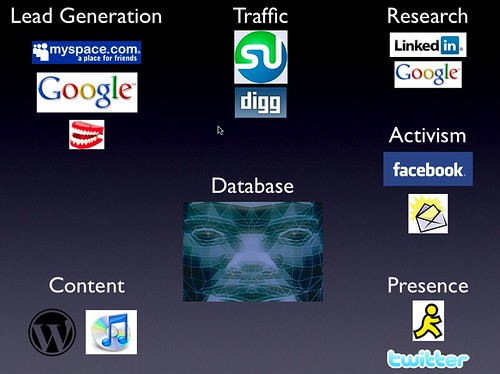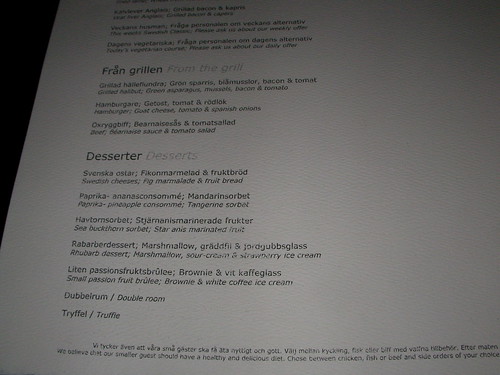… because Mitch Joel and I are bringing it. Here’s a slide from the Marketing Toolkit presentation. All this in thirty minutes and more. We’ll give you your CDN$100 worth.
Blog
-
Know the codes and what they do
If you’re a podcaster using GoDaddy promo codes as part of Podshow or Blubrry, it’s essential to know the numbers behind your promo codes and what they can be used for. Each code has different uses, and if you’re marketing your codes to your listeners, it’s vital to know which codes will fit their needs.
For Podshow Podcasters:
Code 1 is 10% off an order.
Code 2 is 5 off any order30 or more.
Code 3 is 2 off a dot com domain name.For Blubrry Podcasters, I believe there’s a single code which nets 10% off.
Take a look at the GoDaddy products and services out there. Domain names are what they’re best known for, but they have other products and services that will probably net higher payouts that the1-3 per domain name you as a podcaster get for promoting their services.
For example, SSL certificates are used heavily in e-commerce. If you have business listeners, promoting SSL certs is a great opportunity, as some certs cost299/year. The promotions for 10% off the order are the only discount code that will work, and that will save users 30.
Do the math on the codes, especially for Podshow Podcasters.
Code 1 saves 10%. Code 2 saves a maximum of 16.7%, and declines in value as the order size gets larger. Code 3 saves 22%, but only applies to a single product line.
Economy hosting, for example, is about43. Which will save a listener more, code 1 or code 2?
Code 2. A user will save 11.6% vs. 10%.
If you’re committed to providing the best value to both listeners and advertisers, make sure you know your products and services that you’re advertising, and help people understand how they can save the most money.
-
The Long Tail Will Kill You, Jeff Pulver
I read an interesting comment on Jeff Pulver’s blog tonight about Internet TV:
“Seems to me that this is a classic long tail play. The long and simple of it.”
The context of the comment led me to write this quick blog post. The Long Tail is a great play if you’re an aggregator. If you own the network, if you own all the content or the distribution channels, if you own the database, the Long Tail is a payday because it’s one person to a million items over and over, instead of ten thousand people to one item.
The Long Tail is, as Seth Godin proclaims somewhat loudly and quite correctly in his new book, The Dip, a death sentence for the individual. There is only one you, and only 24 hours in your day. If you try to create as much content as possible to capture a Long Tail-esque traffic surge to your properties, you’re going to die tired.
The Short Head – be #1 at SOMETHING – is the only place where the individual truly prospers, unless you’re in charge of the network. If you’re Osama bin Laden, the Long Tail works for you because there’s an unending supply of angry young men who are more than willing to die for the cause, but there’s still only one bin Laden. Lots of deputies may run the franchises, but there’s only one CEO.
To answer Kfir’s question – why aren’t more people watching? Simple (reminder, simple != easy) Long Tail quagmire: with a million channels on, how can you even find something to watch? Who is the Short Head of TV Guides for Internet video that can connect the average TV viewer with new media? When that guide becomes available and is easy to use, integrated with the living room instead of the desktop, Kfir’s mom will probably tune in.
-
PAB Meme
PAB Meme
Bob Goyetche tagged me in this round.
1. Why are you coming to PAB?
I’m coming to PAB because I suddenly found a sizeable chunk of time that was relatively free, and PAB has a great reputation as one of the paid podcasting conferences worth attending.
2. A little homework now: Which PAB registrants would you like to meet? Why?
Well, I think I met nearly 3/4 of PAB registrants at PodCamp Toronto or PodCamp Boston, so I’m definitely looking forward to reconnecting with folks.
3. Who is your “dream interview” for your podcast? Why?
It’s not who so much as how. I’d love to be able to shadow someone really successful and powerful for a day or so, like this guy I heard about named Larry. Larry has juice – one call from him can get situations moving that would otherwise be total losses. I’d love to know how Larry accumulated his juice.
4. Who would you like to interview at podcamp?
Umm, don’t you mean PAB? And honestly, I don’t really want to interview anyone at PAB. I just want to show up and have a good time.
I’m amused, however, that this PAB meme was clearly from a PodCamp one 🙂
5. What is your, “Can’t miss it” session at podcamp?
It’s not sessions – there are can’t miss people at PAB. And no, I’m not going to name names, because I don’t want to slight anyone else.
6. What is your favorite podcast?
Mine. If it wasn’t mine, I would stop doing my show. I have to love the show I do.
7. What is your favorite web resource?
Google.
8. Who is your favorite podsafe musician? (eg. Sean McGaughey).
Depends.
Favorite male artist: Matthew Ebel
Favorite female artist: Natalie Gelman
Favorite male-fronted group: Rayko KRB
Favorite female-fronted group: Uncle Seth
Favorite label: Binary Star Music9. Ginger or Maryanne?
No idea. Who are they?
10. Bob, Mark, or Tod?
Yes.
I tag anyone attending PAB who hasn’t already been tagged.
-
I'm going to PAB2007.
Some extra time appeared in my schedule, so I’m driving up Friday night.

Anyone else from Boston driving? Want to carpool? I have a fuel-thrifty Prius. 🙂
-
Lessons in photography for realtors and people selling houses
Lessons in photography for realtors and people selling houses. A few lessons from this weekend.
1. Use a tripod, always.
Using a tripod will guarantee blur-free photos. My photos are NOT blur-free because I did not use a tripod.
2. Learn to use white balance, and turn OFF your flash.
Here’s the thing about most realtor photos. Most photos are bad, and the number one thing about them is that the lighting is wrong, wrong, wrong. Compare these two photos of the kitchen:
This is with no white balance and a flash. See how dark the cabinets look?
This is with white balance and NO flash.
White balance is easy – point the lens at a white object in the room (a wall) and use it to set the lighting levels.
If you use a tripod, you can avoid using a flash, and that’s a HUGE benefit because it shows the rooms as they’re actually lit, if not a little brighter. Using a flash also tends to throw photos towards the blue end of the lighting spectrum, which feels cold. Most of the time, in most house photos, you want to go for warm, and that means tripod, no flash.
3. Learn the rule of thirds.
Simply put, if you shoot a room square on, you end up with flat, dimensionless photos that don’t give a feel or sense of space.
The rule of thirds is well explained in this wikipedia article.
4. Shoot from hip level or non-traditional angles.
Nothing will make a house feel smaller than shooting from eye level, or higher. Shoot from hip level, low level, or unusual angles to capture more of a sense of space in the house. Sure, you’ll have to adjust your tripod and bend over to take the shot, but the result is WORTH it.
Bottom line: more and more people are browsing on the Internet. Those few digital snaps you take can either entice a prospective buyer, or turn them off entirely. How many sales are you losing with bad photos and you don’t even know about it?
-
Stop Same Sex Marriage
Stop Same Sex Marriage
… the term. By delineating it with its own term, you imply that it’s somehow different than “regular”, heterosexual marriage. The gay and bisexual couples I’ve met in my professional and personal life have had relationships just like I’ve had as a heterosexual male. Using the term same-sex marriage to me implies that it’s different, and should be treated differently in the eyes of the law, the same way that any hyphenated-American automatically separates that group of people from an unbranded American.
Either you’re married or you’re not. Either you’re American or you’re not. Any additional qualifiers are just noise designed to distract and confuse.
Should certain groups of people be prohibited from getting married? Swap out any term and see how well it flies.
Should black people be prohibited from marrying? Same-race marriage.
Should elderly people be prohibited from marrying? Same-age marriage.
Should poor people be prohibited from marrying? Same-economic-status marriage.
Should Catholic people be prohibited from marrying? Same-religion marriage.Want to start changing minds? Start by changing your own. Eliminate the confusion around marriage and the term same-sex marriage by not using that term any longer. Call it what it is.
Bigotry.
-
Oddities in Sweden
Oddities in Sweden:
1. A lot of things are made of wood – like your hotel room key, coffee spoons, ice buckets for the room, clothes hangars, and more. It’s environmentally understandable – better to use wood than plastic, especially for anything disposable, but it’s still odd at times.
2. Leather elevator. I kid you not, the walls of the elevator were paneled with leather.
3. One night stands on the menu. I kid you not – we asked about this at the restaurant, what dubbelrum was, since it was 10 times the price of anything else on the menu. The waitress said, yes, that’s exactly what you think it is. It’s a hotel room upstairs if your date and dinner is going very well.
4. Exceptionally clean. Chris Brogan joked that the city was so clean he could lay down and sleep in the gutters.
5. Not an SUV in sight. Plenty of SMART cars, BMWs, Volvos, Mercedes sedans, a few Toyota Prius cards, but no SUVs at all.
6. English transliteration cannot be phoenticized. For example, PodCamp Europe was held at a town called Alvsjo. It’s pronounced “Elve-koi-ya”.
7. No chlorine in the warm water bathing pool. This was odd to me, but the water was sparkling and clean, not a bit of dirt or other pool critters in sight.
Despite these little idiosyncrasies, Sweden is a beautiful country, and Stockholm seems like a wonderful city to visit and live in. Night life is lively, crime is low, and the city is waking up to new media.
-
Podcasting is missing half a million in Europe
We as podcasters may be missing half a million or more audience members, and we don’t even know it.
Here’s the thing I noticed all over Stockholm, and other European PodCampers confirmed in other countries – there were an awful lot of people listening. They had headphones jacked into devices all over the place.
FEW of those devices were iPods. Of the ones that were MP3 players, the iRiver T series seemed to be the player of choice.
For every MP3 player I saw, I saw 10 mobile phones being used as media devices. Mobile phones that were spinning up music, content, and everything primarily from telco carriers.
I also learned that there are an awful lot of handsets equipped to be able to listen to podcasts – most of the Nokia N and E series phones supposedly can – and that the only thing missing is a way to get the listener to subscribe easily. Right now, asking the user to key in an RSS feed is far below optimal, but if we can figure out a way to get one click subscribe working on those handsets, then podcasts can join the music on headphones everywhere.
If you had the opportunity to have your show – audio or video – on half a million more devices, to half a million more listeners, would you? And how much would that be worth to your show?
-
To the land of köttbullar!
I’m off to Sweden today with PodCamp Co-Founder and partner, Chris Brogan. We’re headed, of course, to PodCamp Europe, a gathering of new media minds veteran and new, for two days of sharing, learning, and growing. It’s shaping up to be a great event, with lots of interest from mobile communications companies, students, journalists, and more – which reflects Scandinavia’s strong points, from what I’ve been reading.
A quick shout out is earned by Andy Nyman and the Swecasters for being co-organizers, and of course to Jeff Pulver and VON, and Audana for sponsoring.
Other random things… apparently, Swedish fish actually were Swedish at one point. The Swedish Chef from the Muppets was not Swedish, but may have been based on an actual Swedish chef. Swedish meatballs are called köttbullar and are served at IKEA. This I did not know.
Rehearsal went well last night for the Podcast Marketing presentation. I’m much happier with the current version, which is a lot more coherent, as opposed to being just a bag of stuff.
If you’re going to be in Stockholm, email me – FinancialAidPodcast at GMail dot com – and we can try to grab a cup of coffee and see the sights of Stockholm!






